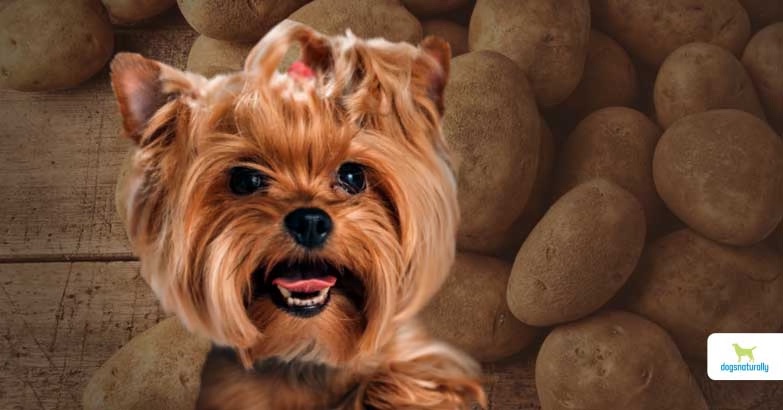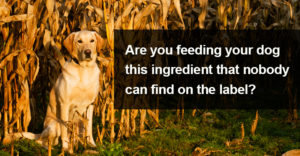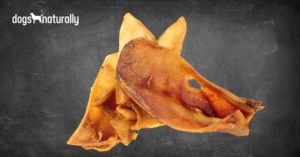Dogs can eat potatoes … but perhaps a better question is … should they?
You’ll see a lot of marketing for commercial dog foods saying carbohydrates like potatoes are good for your dog … but that’s only because they’re cheap fillers. Potatoes don’t necessarily hurt your dog … but they don’t help him either.
Can Dogs Eat Potatoes?
There’s no reason for dogs to eat potatoes. Historically and genetically, dogs have no nutritional need for starchy carbohydrates … including potatoes.
Many will argue that dogs can digest carbohydrates like potatoes and that makes it perfectly acceptable to include them in their diet. But not if you consider your dog’s ancestors. They were opportunistic hunters and ate the remains from the bellies of their prey. If they were vegetarian like deer, the stomach contents would contain fruit and plants. And wolves have been documented eating fruit (that contains carbohydrates) and would digest it.
But these habits of your dog from centuries ago or his wild cousins don’t mean he should eat a diet of starches, grains and carbohydrates … that require cooking and processing to be fully digestible by dogs.
Your dog can survive on a diet of protein and fat, which are healthier food sources for him. When you add in some fruits and vegetables, your dog has all the nutrients he needs to build healthy cells and body structures. Carbohydrates only serve your dog as an energy source. But protein and fat are better as healthy energy sources … in addition to the other nutritional benefits they provide.
RELATED: Read more about why starch can be bad for dogs …
Nutrition In Potatoes
Potatoes are a source of vitamins and minerals that include vitamin C, vitamin B6, iron, and potassium, iron, calcium and magnesium. They provide benefits for your dog’s immune and nervous systems.
However, potatoes have high levels of carbohydrates and that means calories. Feeding your dog large amounts of potatoes, or anything with high carbohydrate content, can lead to weight gain. So, if you must feed potatoes, do so only in moderation.
But there are also plenty of other foods for dogs that are a healthier option … like berries and green veggies … without the calories and without potential toxins. Yes … potential toxins.
Are Potatoes Safe For Dogs?
Raw potato and undercooked potato can be toxic to dogs. Potatoes are part of the nightshade family of plants (1). This category includes tomatoes, peppers and eggplant as well as potatoes. Each of these fruits and vegetables contains solanine. Potatoes also contain oxalic acid.
Solanine
Solanine (2) is a glycoalkaloid, which is a natural pesticide that potatoes produce to protect them from fungus. There are higher levels of solanine in potatoes with green skin, raw potatoes, potato skins, and the greens and stalks of the potato plant. This is why your dog should never eat an uncooked potato or potatoes with green skins. However, thorough cooking (3) reduces the solanine toxicity level. Plain potatoes can be boiled, baked and mashed, without seasoning. Avoid adding dairy as some dogs can’t tolerate it. You can give bites of potato or add some as an occasional treat but don’t overdo it.
Solanine is only toxic in large amounts. But since potatoes seem so harmless and budget-friendly, it does happen especially when used as a staple food. And of course, if potatoes are in your dog’s commercial food, it’s unlikely anybody’s checking the potatoes for green spots before they go in the kibble mix. Signs of solanine poisoning (4) include:
- Muscle weakness
- Lethargy
- Difficulty breathing
- Upset stomach
- Gastrointestinal distress
And it can cause heart problems. Serious cases can affect the central nervous system. If there’s vomiting or diarrhea, it’s important to give your dog lots of fluids so he doesn’t become dehydrated.
Oxalic Acid
Oxalic acid (2) can appear to a lesser degree. It’s an organic acid that can bind calcium and other minerals. That makes them insoluble and decreases bioavailability. High amounts of oxalates can cause decreased bone growth, kidney stones, renal toxicity, vomiting, diarrhea, convulsions, coma and impaired blood clotting.
Do Potatoes Affect Blood Sugar Levels?
When your dog eats carbohydrates like potatoes they’re broken down into glucose, which becomes energy. Insulin is released to move the glucose into the cells. This becomes a problem when large amounts of starchy carbs like potatoes form part of your dog’s diet. They’ll cause blood sugar spikes, so insulin is constantly being secreted to manage the glucose. Over time, your dog can become less sensitive to insulin, causing the pancreas to produce more insulin more often. Ultimately it can lead to insulin resistance and diabetes.
Insulin resistance puts your dog at risk for thyroid disease and some types of cancer. One of the roles of insulin is to store body fat, so it can cause weight gain in your dog. It can be a challenge to remove the weight when his system isn’t regulating carbohydrate consumption properly.
Are Sweet Potatoes Better Than Potatoes?
Sweet potatoes are also carbohydrate-heavy so they’re not much better for your dog … and they aren’t a healthy snack. But they do have some benefits compared to white potatoes. They contain plenty of fiber, which supports digestive health. And they have some important nutrients: vitamin A, vitamin B6, vitamin C, calcium, potassium, magnesium and iron. Sweet potatoes also contain beta-carotene, a precursor for vitamin A … and it’s also an important antioxidant that boosts immunity.
But with the calorie and starch content, they’re still not the healthiest option for your dog. And if your dog is diabetic, any kind of potato can cause a spike in blood sugar. So it’s best to avoid all types of potatoes.
So … while your dog can eat and digest potatoes, they really don’t have a place in a whole food, raw meat diet for your dog. Instead, include lots of meaty bones, organs, fruits and vegetables that are rich in nutrients … and low in carbohydrates … for a healthy dog.
References
1. Barceloux, DG. Potatoes, Tomatoes, and Solanine Toxicity (Solanum tuberosum L., Solanum lycopersicum L.). Medical Toxicology of Natural Substances: Foods, Fungi, Medicinal Herbs, Toxic Plants, and Venomous Animals. John Wiley & Sons, 2008. pp. 77-83.
2. Dolan LC, Matulka RA, Burdock GA. Naturally occurring food toxins. Toxins (Basel). 2010 Sep;2(9):2289-332.
3. Hejtmánková K, et al. Effect of peeling and three cooking methods on the content of selected phytochemicals in potato tubers with various colour of flesh. Food Chem. 2013 Jun 1;138(2-3):1189-97.
4. Kees M, Beckel N, Sharp C. Successful treatment of Solanum dulcamara intoxication in a Labrador retriever puppy. Can Vet J. 2015 Dec;56(12):1283-6.












